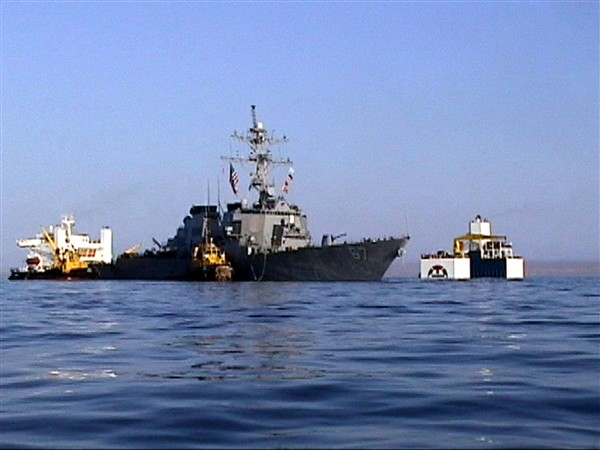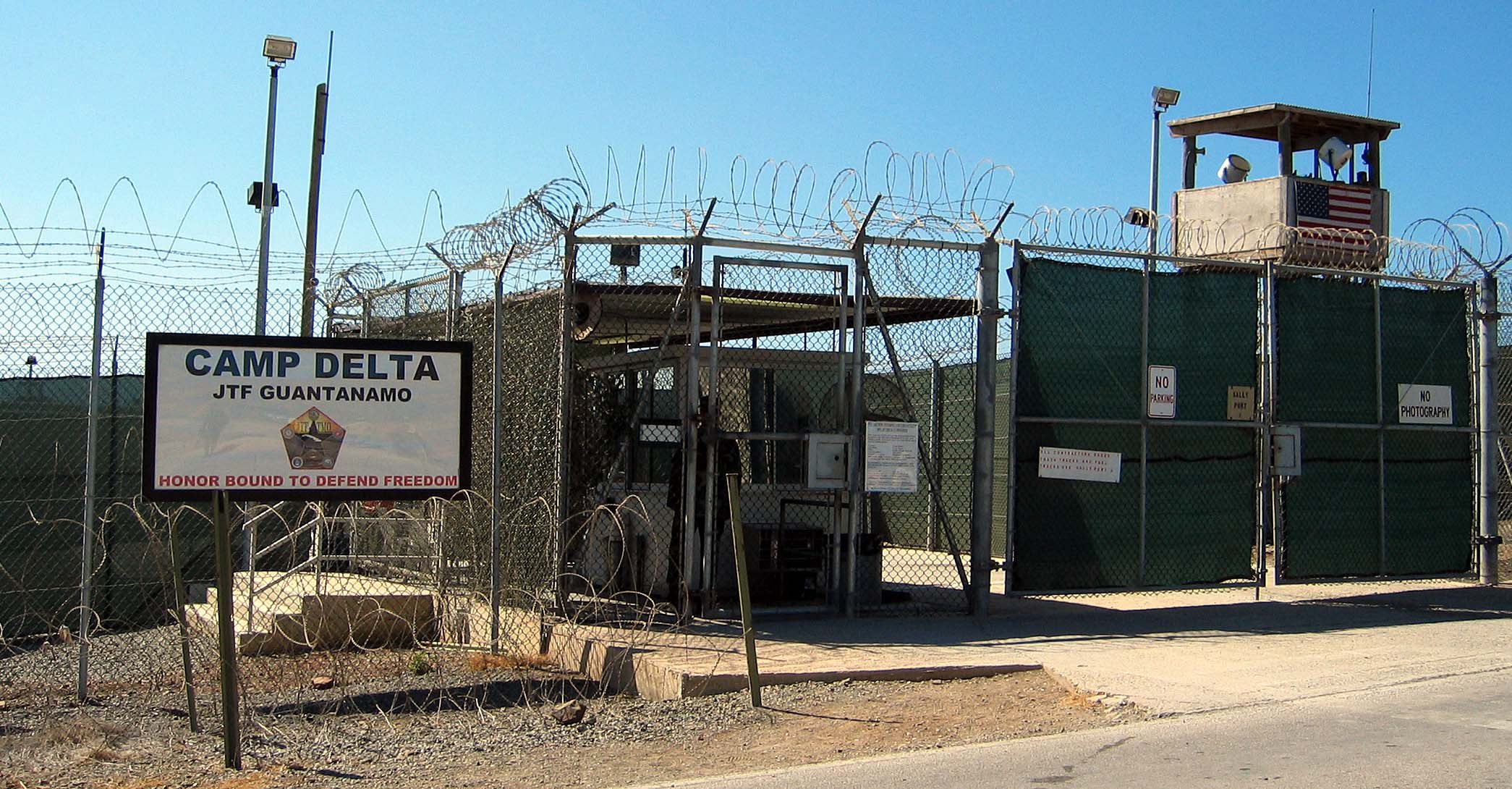
GUANTÁNAMO BAY, Cuba — A federal appeals court on Tuesday threw out more than two years of a military tribunal judge's decisions in the case of the man accused of plotting the bombing of the destroyer Cole, finding that the jurist wrongly hid his pursuit of an immigration judge job while sitting on the war crimes case.
The decision by the United States Court of Appeals for the District of Columbia Circuit was a major setback in the oldest death-penalty case at Guantánamo Bay, and yet another twist in a winding and fraught case that has come to symbolize the government's difficulties in pursuing prosecutions of detainees through the military tribunal system.
Abd al-Rahim al-Nashiri, 54, who has been in American custody since 2002, has been represented by military commission defense lawyers since 2008 and was formally charged in 2011. Mr. al-Nashiri, a Saudi, is accused of being the architect of Al Qaeda's suicide bombing of the Navy destroyer Cole off Yemen on Oct. 12, 2000. Seventeen American sailors died, and dozens more were wounded.
But more than seven years after Mr. al-Nashiri's arraignment, the case is still in pretrial hearings to determine what law and evidence would apply at a capital trial by the military commission. The decision means a new military judge will have to revisit defense challenges to the charges, what evidence prosecutors must provide Mr. al-Nashiri's lawyers and fundamental constitutional questions about the legality of the military commission system.
The crux of the issue confronting the appeals court was whether the judge, the now-retired Air Force Col. Vance Spath, was wrong not to disclose that he had applied for and obtained an immigration court job with the Justice Department while sitting on the case, which was being jointly prosecuted by Justice and Defense Department lawyers.
The three-judge panel found that he was and threw out all of Colonel Spath's decisions from November 2015 to February 2018, when the judge suspended the case pending higher court review. His Justice Department job offer was still secret at the time.
Judge David Tatel wrote in the appeals court's 31-page opinion that the court recognized "the burden" that the decision "will place on the government, the public, and al-Nashiri himself."
"Despite these costs, however, we cannot permit an appearance of partiality to infect a system of justice that requires the most scrupulous conduct from its adjudicators," Judge Tatel said.
Ron Flesvig, a spokesman for the military commissions, said on Tuesday that prosecutors had no immediate comment on whether they would seek a review by the full appeals court of the question or challenge the decision at the Supreme Court, developments that could even further delay the start of the death-penalty trial. Colonel Spath did not respond to a message left seeking a comment at his Arlington, Va., immigration court office.
Capt. Brian Mizer, a defense lawyer for Mr. al-Nashiri, said based on the latest development it would be nearly impossible to predict when the case would come to trial.
"I would hate to hazard a guess," Captain Mizer said. "Eleven years of litigation to get where we are now would suggest Mr. al-Nashiri's trial defense team may be in high school right now. Which is a tragedy for everyone involved."
A survivor of the Cole bombing, retired Navy Senior Chief Joe Pelly, said he was "kind of shocked" by the decision. He added that he was particularly disappointed for "the parents of the children that were killed," a reference to the young sailors who were killed in the bombing, which struck the ship's galley for enlisted sailors.
"I just believe that we, the Cole survivors, and the Gold Star family members have just been a pawn in this whole process," he said. "But hopefully our time shall come that we can move forward in this case."
Captain Mizer, a Navy reservist, was returned to the case last year at Colonel Spath's request. All of Mr. al-Nashiri's civilian counsel quit the case in October 2017 in an ethics dispute with the judge.
His civilian lawyers had found a microphone hidden in the wall of their meeting room at the United States Navy base prison, but Colonel Spath prohibited them from investigating its purpose or telling their client about it as a potential violation of attorney-client confidentiality because the information was classified. Prosecutors eventually disclosed the discovery in a court filing that called the microphone a "legacy" listening device, and said nobody eavesdropped on the team.
The three-judge panel faulted Colonel Spath, case prosecutors and a Pentagon appeals panel called the United States Court of Military Commission Review. "Criminal justice is a shared responsibility," the panel wrote, adding that in this case, only Mr. al-Nashiri's defense team had shouldered it.
First, the judge failed to disclose his job pursuit. Later, prosecutors rejected a request by Mr. al-Nashiri's lawyers for information about Colonel Spath's quest to find a civilian job before retirement, and the Pentagon panel agreed that defense lawyers were not entitled to it.
That information emerged through a Freedom of Information Act request for Colonel Spath's immigration court application and supporting materials filed by the news organization McClatchy. Defense lawyers appended it to their appeal.
The court found it "especially troubling" that Colonel Spath issued most of his classified rulings in the national-security case "in a flurry" after Jeff Sessions, then the attorney general, agreed to his appointment to be an immigration judge in March 2017.
At military commissions, prosecutors can present the judge directly with classified information and get permission to use a substitute for original evidence, citing the need to protect national security.
To undo those secret substitutions, the appeals court turned the clock back.
Once back on track, a new judge will have to reconsider Colonel Spath's invalidated decisions and revisit a prosecution request to pre-admit hundreds of pieces of physical evidence F.B.I. agents tagged from the wreck of the ship in Aden, Yemen, as well as several safe houses in Aden. In both instances, hearing testimony showed, sailors on the heavily damaged destroyer and Yemeni police or intelligence agents got to the evidence first.
Also apparently thrown out was a closed-court deposition Colonel Spath took at Guantánamo Bay from a confessed Qaeda terrorist. Ahmed Muhammed Haza al-Darbi testified against Mr. al-Nashiri before being repatriated in May to serve a prison sentence his native Saudi Arabia.
It was unclear how far-ranging the effects of the Cole case decision would be.
But a defense lawyer in the Sept. 11 capital case, James Connell, said on Tuesday that he would renew an objection to that case's trial judge, Col. Keith Parrella of the Marines, because the colonel had done a 2014-15 fellowship as an on-loan prosecutor at the counterterrorism section of the Justice Department's National Security Division.
They had argued that the colonel's earlier role presented a particular ethical conflict because four of the nine prosecutors on the Sept. 11 case work for the same unit.
Government lawyers defending Colonel Spath's decisions had argued that the Executive Office for Immigration Review was a far-removed division of the Justice Department, so the colonel had no obligation to disclose his job pursuit.
The appeals panel, however, found that "the attorney general was a participant in al-Nashiri's case from start to finish: He has consulted on commission trial procedures, he has lent out one of his lawyers and he will play a role in defending any conviction on appeal."



